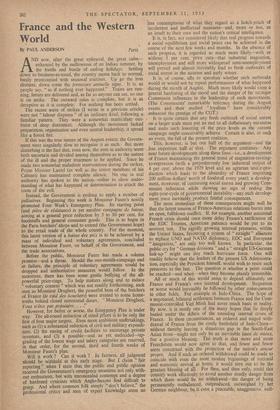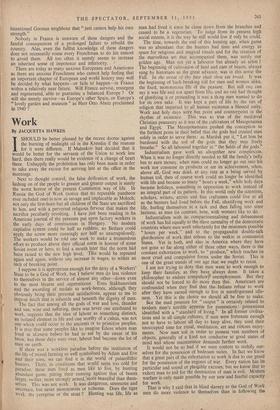France and the Western World
AND now, after the great upheaval, the great calm— enhanced by the mellowness of an Indian summer, by the hustle and bustle of ending holidays. Settling down to business-as-usual, the country seems back to normal, busily preoccupied with seasonal routines. Up go the iron shutters; down come the fermeture annuelle signs. It is, as people say, " as if nothing ever happened." Trains are run- ning; letters are delivered and, as far as anyone can see, no one is on strike. The outward calm is complete, but it is as deceptive as it is complete. For nothing has been settled.
The recent wave of strikes (I wrote in a previous article) were not " labour disputes " of an ordinary kind, following a familiar pattern. They were a somewhat inarticulate out- burst of deep discontent. Although the movement lacked preparation, organisation and even central leadership, it spread like a forest fire.
If this was the true nature of the August events, the Govern- ment were singularly slow to recognise it as such. But more disturbing is the fact that, even now, the men in authority seem both uncertain and divided among themselves as to the nature of the ill and the proper treatment to be applied. Since he made two somewhat maladroit interventions during the strikes, Prime Minister Laniel (as well as the senior members of his Cabinet) has maintained complete silence. No one in real authority has spoken to the nation—either to show under- standing of what has happened or determination to attack the roots of the evil.
Instead, the Government is rushing to apply a number of palliatives. Beginning this week is Monsieur Faure's noisily promoted Four Week's Emergency Plan. Its starting point (and piece de resistance) is yet another campagne de baisse, aiming at a general price reduction by 5 to 10 per cent. for foodstuffs and general consumer goods. This is to begin in the Paris butchers' shops and to extend (the Government hope) to the retail trade of the whole country. For the moment, this latest version of a baisse des prix is to be achieved by a mass of individual and voluntary agreements, concluded between Monsieur Faure, on behalf of the Government, and the trade associations.
Before the public, Monsieur Faure has made a solemn promise—and a threat. Should the one-month-campaign end in failure, the principle of voluntary agreements would be dropped and authoritative measures would follow. In the meantime, there has been some gentle bullying of the all- powerful price-rings. To help matters along and to induce " voluntary consent " which was not readily forthcoming, such men as Monsieur Drugbert, the powerful boss of the butchers of France (le caid des bouchers) were treated to some home- truths behind closed ministerial doors. " Monsieur Drugbert, Vous n'etes pas populaire. . . ." However, for better or worse, the Emergency Plan is under way. The all-round reduction of retail prices is to be only the first of four major targets. Even more ambitious undtrtalcings, such as (1) a substantial reduction of civil and military expendi- ture, (2) the easing of credit facilities to encourage private investors, and (3) a possible—and as yet undecided—up- grading of the lowest wage and salary categories are reserved, in that order, for the second, third and fourth weeks of Monsieur Faure's plan. • Will it work ? Can it work ? In fairness, all judgment should be withheld at this early stage. But I claim ' fair reporting " . when I state that the public and public opinion received the Government's emergency measures not only with- out enthusiasm, but with unconcealed contempt and a degree of hardened cynicism which Anglo-Saxons find difficult to grasp. And where common folk simply " don't believe," the professional critics and men of expert knowledge seem no less contemptuous of what they regard as a hotch-potch of incoherent and ineffectual measures—and, more or less, as an insult to their own and the nation's critical intelligence.
It is, in fact, not considered likely that real progress towards a social equilibrium and social peace can be achieved in the course of the next few weeks and months. In the absence of such progress, it is regarded as much more likely—with or without 5 per cent. price cuts—that industrial stagnation, unemployment and still more widespread semi-unemployment will prevail and almost inevitably lead to fresh outbreaks of social unrest in the autumn and early winter.
It is, of course, idle to speculate whether such outbreaks would or would not be repeat performances of what ,happened 'during the month of August. Much more likely would seem a general hardening of the mood and the danger of far stronger Communist influences in the leadership of such movements. (The Communists' remarkable reticence during the August events and . their studied " loyalism " have considerably enhanced the prestige of the CGT.) It is quite certain that any fresh outbreak of social unrest on a larger scale must put an end to all deflationary measures and undo such lowering of the price levels as the current campaign might conceivably achieve. Certain is also, in such an event, the fall of the present coalition.
This, however, is but one half of the argument—and the less important half at that. The argument continues: Any near future developments along these lines—i.e., a development of France maintaining the general trend of stagnation-turning- to-regression (with a preposterously low industrial output of 4 per cent. above the 1929 level and an agrarian under-pro- duction- which leads to the absurdity of France importing 200 million dollars' worth of foodstuff every year); a develop- ment, moreover, of continuing social unrest and growing Com- munist influences while showing no sign of ending the eight-year-cycle of governmental instability—any such develop- ment must inevitably produce fateful consequences. The most immediate of these consequences might well be that the latent tension of Franco-American relations bursts into an open, fuliblown conflict. If, for example, another autumnal French crisis should once more delay France's ratification of the EDC Treaties, American patience would be put to its severest test. The rapidly growing internal pressures, within the United States, favouring a system of " straight " alliances to replace UNO and NATO diplomacy, EDC and European " integration," are only too well known. In particular, the public cry for " German divisions " and a " straight US-German " might one day reach hurricane force. One will readily believe that the leaders of the present US Administra- tion, especially the President himself, would wish to resist such pressures to the last. The question is whether a point could be reached—and when—when they become plainly irresistible. All or much of this would seem to depend ultimately on France and France's own internal development. Stagnation or worse would inevitably be followed by other consequences in other fields. For example in Indo-China. The hope of a negotiated, bilateral settlement between France and the Com- munist-controlled Viet Minh had never much basis in reality. By now, it is surely one of the many hopes that lie deeply buried under the debris of the unending internal crises of France. In these circumstances, an ordered and staged with- drawal of France from the costly battlefield of Indo-China— without thereby leaving a disastrous gap in the South-East Asian front—might not only be an inevitable faute de mieux, but a positive blessing. The truth is that more and more Frenchmen would now agree to that, and fewer and fewer seem concerned with the protection of the nation's amour propre. And if such an ordered withdrawal could be made to coincide with even the most modest beginnings of national and economic revival at home, it would turn out to be the greatest blessing of all. For then, and then only, could this country work effectively to avoid another deadly danger from which there would be no withdrawal—the danger of being permanently outbalanced, outproduced, outweighed by her German neighbour, be it even a peaceable, unaggressive, well- intentioned German neighbour that " just cannot help his own strength:' Nobody in France is unaware of these dangers and the fateful consequences of a prolonged failure to rebuild the country. Alas, even the fullest knowledge of these dangers does not necessarily rouse every Frenchman to do his utmost to .avoid them. All too often it merely seems to increase an inherited sense of impotence and inferiority. • There are today as many anxious Europeans and Americans as there are anxious Frenchmen who cannot help feeling that an important chapter of European and world history may well be decided by what happens—or fails td happen—in France within a relatively near future. Will France survive, resurgent and regenerated, able to guarantee a balanced Europe ? Or will she merely survive—as, Europe's other Spain, or Europe's " lovely garden and museum " as Herr Otto Abetz proclaimed in 1940 ?



































 Previous page
Previous page